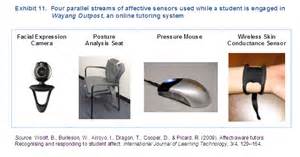Buried deep in a 2012 report on “Educational Data Mining and Learning Analytics,” the US Department of Education states that one of the key applications of educational data mining is “user profiling” (page 25).
The paragraph says: “These application areas are (1) modeling of user knowledge, user behavior, and user experience; (2) user profiling; (3) modeling of key concepts in a domain and modeling a domain’s knowledge components, (4) and trend analysis.”
Later on, in Exhibit 1, we see a flow chart. It shows “student learning data” flowing into the “predictive model,” the “intervention engine” and then into the “adaptation engine.” Clearly, the goal is government-directed behavior modification following student psychological profiling.
This is sad, because “users” now include even babies, since the Department of Education has successfully pushed ESSA into law, with its “early childhood education” programs that are included in the citizen data mining venture.
The Educational Data Mining report of 2012 is not the only such report from the U.S. Department of Education. Related is its 2013 report, “Promoting Grit, Tenacity and Perseverance” which contained more of the same psychological data gathering goals.
The “Promoting Grit” report included pictures of biometric sensory devices: pressure mouse sensors, posture analysis seats, facial expression cameras, and wireless skin conductance sensors, which would mine student psychological elements, including “grit,” “tenacity,” “perseverance” and more.

In SETRA (the Strengthening Education Through Research Act, currently in the US House of Representatives, having somehow passed the Senate) we find that the federal research programs will be strengthened and enlarged so that more data, including “social and emotional learning” will be gathered for federal use.
Philosophical and constitutional questions need to be hotly debated by the House of Representatives. More importantly, these need discussion at the dinner table, by moms and dads and teachers and principals and school board members:
- Will American children grow up free– as self-governing, free agents, with intellectual and moral privacy and the accompanying power to soar outside any box, as well as the power to fail? How, if even their thoughts and beliefs are monitored and subjected to “intervention”?
- Do Americans want students to be profiled, centrally managed, and nudged in a predetermined, government-and-workforce approved direction –constantly monitored and told what to do? If so, what qualifies central planners to trump individuals’ and families’ desires?
- Does widespread societal faith in “experts” relegate personal privacy and real autonomy to historical artifact? Should personal data be studied and behavior “intervened” by unsupervised central planners? Will this really keep us “safe,” as cogs in a centrally managed, economy-focused collective? Do we want to be a government-branded herd, or free, individual, human beings?
- If we allow government to keep psychological profiles (not just on students– since the P-20 Workforce Pipeline means preschool through workforce citizens get tagged) –then, what happens if a thirty year-old wants to buy a gun, and his background check comes back negatively because when he was in 5th grade, his data was interpreted to mean future depressed individual? And what if his 5th grade data was incorrect?
- What if “at-risk academically” is redefined and applied to a student for attending a private, religious, or home school?
- What if “mentally unstable” is applied to anyone who does not agree with what is being taught in school?
- What if “socially deviant” is applied to anyone who disagrees, or is bored with, collectivist groupthink and group work? –The “what if” list could be endless.
The fact that “profiling’s already here” is no excuse. We can begin where we are, and take a stand today. It is true that our students are already being psychologically profiled, to some degree, by the government and schools, already: look at the math standard for Common Core that requires a student to be tagged for presence or absence of “perseverance”. That’s not about math; that’s about psychology and character.
The perseverance tag and others like it will certainly be on the SAGE (Common Core, CEDS aligned) tests; notably in Utah and Florida, which use tests created and scored by the behavioral research company AIR (American Institutes for Research).
For additional evidence of current psychological profiling, look at Utah’s “Student Strengths Inventory,” which gathers nonacademic data on high schoolers.
But none of that is any excuse.
If rain is leaking through a hole in the kitchen, that does not mean we can innocently stand by while someone pokes holes in our living room roof and the bedroom ceiling, and makes plans for the removal of the roof.
The Father of the Constitution, James Madison, said that if men were angels, no government would be necessary. To that I add, if governments and corporations were angels, no privacy protections would be necessary; student data would be consensually collected, analyzed, and used to bless the lives and enlarge the opportunities of every student. But men, governments, and corporations are not angels. That’s why We, the People, need to stop invasive bills like federal SETRA; it’s why we need to write and pass good, protective laws locally.
Take action today.
Write a letter. Make a phone call. Meet with a legislator. Pray with great faith; miracles of knowledge and understanding and miracles within political workings are needed, to awaken an asleep populace and to build up protections for our children’s minds, hearts, and freedoms.
https://whatiscommoncore.wordpress.com/2016/02/10/user-profiling-by-department-of-ed-stopsetra/
No comments:
Post a Comment